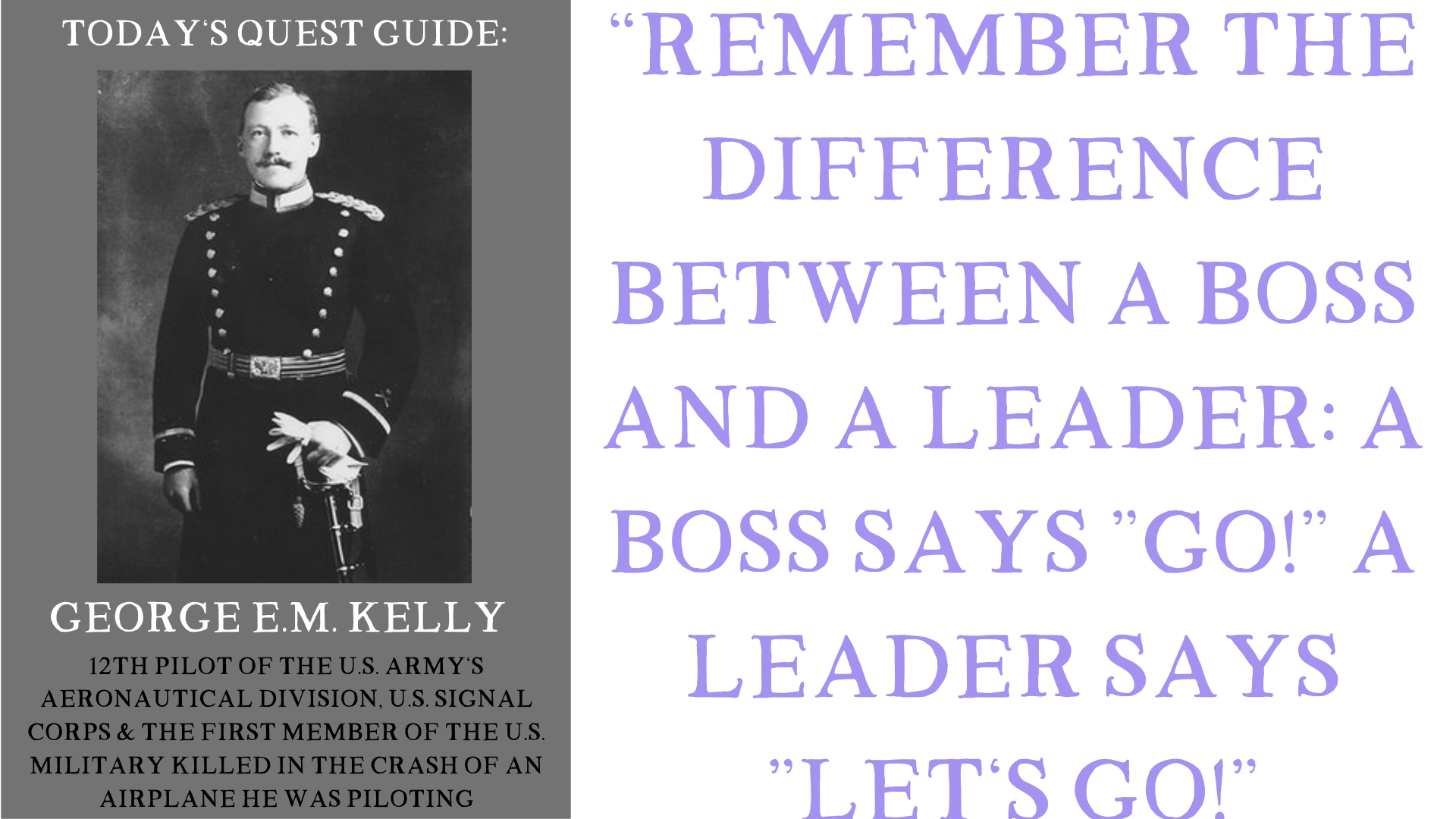Kay:
Hey there, Questers. welcome back! It’s Friday, October 16th and this is Episode 205. We have a very appropriate quote for you today because it is National Bosses Day. The quote is, “Remember the difference between a boss and a leader. A boss says ‘Go’, a leader says, ‘Let’s go.”

Shi:
This quote comes to you from E. M. Kelly, who was a 12th pilot in the US army, and, sadly, the first member of the US military killed in the crash of an airplane that they themselves were piloting. But, regardless of how he ended, E. M. Kelly’s differentiation here between boss and leader is one I think that we could all use to keep in our minds, especially as we try to climb that corporate ladder.
Kay:
Well, one of our very favorite leadership experts, the one and only John Maxwell, has revealed to his team of coaches, speakers, and trainers at a recent conference that he is “leadership sad”, because he says that the world is devoid of really good leaders right now. And so, I think we have a lot of bosses in a lot of positions that are telling other people what to do, or making unreasonable expectations. But, what makes a leader? What takes somebody from, “Go” to, “Let’s go?” How do we get there? John describes it in his book, Leadershift, as going from “me” to “we.” Figuring out places where you’re not the only one that wins, but that more people around you, those who are helping and supporting your cause, that they win as well.
Shi:
Well, it’s easy to tell others what to do. It’s easy to declare initiatives and outcomes that you wish to see and try and put the “foot down,” if you will. And that’s really that boss role. But bringing in this differentiation here of a leader being the one that says, “Let’s go.” It’s a small shift, but it’s a whole different ball game when we say, “Let’s go,” it’s this inclusive piece. It’s exactly what John is alluding to here, when he says a leader goes from “me to we”, and that can be a tough shift for anybody, especially for those people who are in positions of power. And so, it’s ultimately incredibly important for us to keep this in the forefront of our mind, especially those of us who are achievers, which – if you listen to this podcast – I can guess you like achieving and that you’re striving to achieve more. So, it’s a great thing to keep in mind as we do that.
Kay:
Here’s the hardest thing I think for many achievers to accept about going from me to we, is that it’s going to slow you down.
Shi:
So much slower.
Kay:
SO much slower. But the thing is, is that you can’t go as far as fast, but you’ll go further for a lot longer because you’ve got other people alongside you. And I believe that it’s an old African proverb that says, “If you wish to go fast, go alone. If you wish to go far, go with others.” And so if you are in any form of a leadership position, being that leader and not necessarily relying on just bossy skills or bossing people around, helps that win, win, WIN situation, because you need other people if you’re playing the infinite game for something that has some sticking power on the world and your legacy.
Shi:
Well, here on a National Bosses Day, this is a great time to be talking about this and there’s lots of different ways we can use the word “boss.” It’s definitely become a cool thing as well.
Kay:
Right?! You’re a BOSS, man!
Shi:
Hey, that’s boss!
Kay:
Oh, god. We just took the cool version of boss and made it super uncool.
Shi:
No, it’s still cool. It’s still cool. You want to be a boss leader, right? You want to be really good at your leadership, but you saying boss reminded me of just that a lot of us, (especially as young ladies), get called when we are demonstrating leadership skills that are maybe a little less honed and less refined – and that’s when you get called bossy. And this happens more to girls than it does to boys, but it certainly happens across the board, but this is a phenomena when the leader becomes a boss before they are necessarily good at leading. So, changing the narrative from “go” to “let’s go” is such a slight change, but just including yourself in the initiative and in the action is really that leadership piece, versus that telling others what to do. And when you first get into a leadership position, you can usually think about it like, “I’m the one who makes decisions. I’m the one who tells people what to do.” And you can see that’s where you get lost in the weeds here.
Kay:
Well, it can feel good to feel like you’re not the only one that necessarily has to put up the work. But, oftentimes, we get many people in new leadership positions who get so excited and enamored with the idea of not having to be the only one putting in the work that they forget that they’ve got to be the ones putting in the most work out of anybody. Because you can’t expect your team to do anything that you don’t expect yourself to do, or to at least show up for. Now, that doesn’t mean you don’t play to your strengths. Or if you’re a spreadsheet wizard that can do the best spreadsheets ever that you have to do better spreadsheets, that’s not what I’m saying. Just having those general expectations of yourself. If you expect them to show up for the project with their complete and full attention, then you need to show up for both the project and for them with your complete and full attention as well.
Shi:
So just to remind you, E. M. Kelly told us, “Remember the difference between a boss and a leader. A boss says, ‘Go,’ a leader says, ‘Let’s go.”
Kay:
All right, gang. So, today is a “be your best boss quest,” which means we want you to do a little bit of reflection and think a little bit about the person or group of people that you lead. Maybe it’s your family, your team, or your community. Reflect on one small tweak that you can make to lead more from “we” and less from a space of “me.” Are you ready?
Kay & Shi:
Let’s quest!




